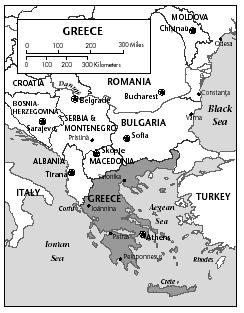Greece - Political background
Twentieth-century Greek history records repeated confrontations with its neighbor Turkey (the successor of the Ottoman Empire). Greece gained its independence from the Ottoman Empire in 1830 after a prolonged war of liberation with substantive help from Great Britain, France, and Russia. Territorial disputes with the Ottoman Empire over the disposition of the Balkan territories brought about a succession of Balkan Wars (1912–13). After these wars were concluded, Greece significantly increased the size of its territories at the Ottoman Empire's expense.
After World War I, Greece occupied western Anatolia following the defeat of the Ottoman Empire. The occupation, though, resulted in Greece's military defeat and a massive exchange of populations between Turkey and Greece. In total, about 1.5 million refugees came to Greece, and about 800,000 Turks were transferred from Greece to Turkey by 1922. Also, Greece and Bulgaria agreed to an exchange of their ethnic minorities; about 92,000 Bulgarians left Greece for Bulgaria, and 46,000 Greeks emigrated from Bulgaria to Greece.
From 1925 to 1935, Greece was a republic. After the restoration of the monarchy, a right-wing dictatorship was established by Ioannis Metaxas. In October 1940, however, Greece was attacked by the Italians, and after April 1941 the German occupation forces controlled political power in the country. The Greek monarchy was returned to power in 1946, after the end of Axis occupation during World War II (1939–45). The civil war between the royalists and Communists that erupted during this period ended when Communists were defeated with British and U.S. military assistance in 1949.
In 1964 a center-left coalition called the Center Union led by George Papandreou gained a parliamentary majority, ending the long period of successive conservative governments of 1949–64. This new era was marked by continual political crises as the country remained ideologically polarized between left and right, leading to the establishment of a military junta in 1967.
Political difficulties, the disputes with Turkey, and growing inflation laid the groundwork for transition to civilian rule. In the 1974 parliamentary elections, Constantine Karamanlis was confirmed as the prime minister. Karamanlis, the leader of the center-right New Democracy (ND), further expanded his political influence following the 1977 elections, in which his party gained a substantial victory.
In the 1981 general election, Andreas Papandreou's left-wing Panhellenic Socialist Movement (PASOK) won a clear victory. Papandreou was reelected in 1985. His party lost power in 1989 because of highly publicized scandals. After four years in opposition, PASOK returned to the government, again headed by Papandreou, in the elections of October 1993. Illness forced his resignation on 15 January 1996, and Kostas Simitis was sworn in as his replacement. Hoping to achieve a broad mandate from voters, he called for legislative elections on 22 September. His Panhellenic Socialist Movement won 41.5% of the vote—giving him a comfortable majority in parliament. Under Simitis's leadership, PASOK won reelection on 9 April 2000 with 43.8% of the vote.
Despite significant military influence in the past, Greece is now a parliamentary democracy with a 300-member unicameral Parliament (Vouli ton Ellinon). Political power rests largely with the premier while the president fills a mainly ceremonial role. Following the 9 April 2000 elections, the major political parties represented in Parliament are PASOK (158 seats) and ND (125 seats). The remainder of seats are held by the Greek Communist Party (KKE) and Coalition of the Left and Progress (SYN).

Comment about this article, ask questions, or add new information about this topic: